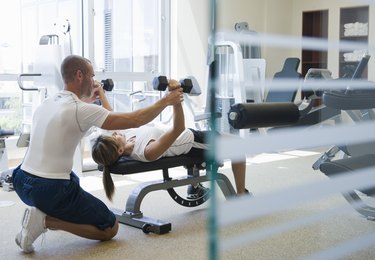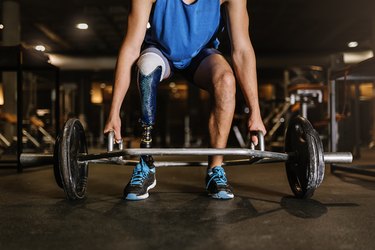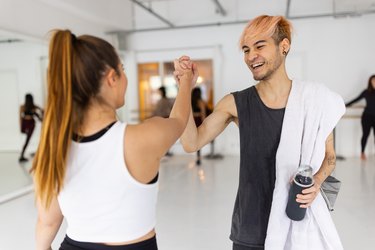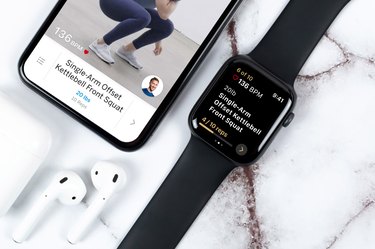
Sometimes we all need an extra push (or help getting started) where workouts are concerned. This is where a personal trainer comes in. Not only can they provide a plan, but they also help you adhere to your goals and perform moves safely and correctly to help avoid injuries.
But finding the right trainer is kind of like dating — you may have to kiss a few frogs to find your perfect match. And there's no shortage of fitness pros these days: The hashtag #personaltrainer unearths 48.1 million posts on Instagram, putting a myriad of choices (not all good) in the palm of your hand.
Video of the Day
Video of the Day
A better place to start is at a reputable gym (think big box gyms or even your local fitness studio) to inquire about personal trainers.
Another super effective way to find your personal trainer: referrals. If someone you know has first-hand experience with a specific trainer, they can give you some insight into that pro's style, personality and how effective they have found them to be. While a referral isn't a 100 percent guarantee that the trainer will be a good fit for you, it may make you feel better that the recommendation "is coming from someone you respect and someone who has gotten good results," Darren Ross, certified personal trainer and owner of P13 Fitness, tells LIVESTRONG.com.
Where to look is just half of the battle, though. After you source a few options, you have to determine which one will work best with you.
There's no one-size-fits-all approach to finding a personal trainer, and what works for someone else might not work for you. You can find a trainer in person or on virtual platforms including apps like Future and Freeletics, depending on which option fits your lifestyle and needs.
6 Questions for Finding the Right Personal Trainer
If you find someone you think might be a good fit, there are some questions that are worth answering. Our experts give us the scoop on what to look for and what might be a red flag.
1. Are They Certified?
A certified personal trainer will be truly knowledgeable about the body, how to properly train it and the science behind what works and what doesn't. Look for credentials from certifying organizations like the American College of Sports Medicine (ACSM), the National Strength and Conditioning Association (NSCA) or the National Academy of Sports Medicine (NASM). These certifications, and others, are bestowed from accredited organizations that have ensured trainers know their stuff through coursework and examinations.
You also want to make sure the person you choose is not only certified but that their certifications are up to date. For example, I am a NASM-certified trainer, and every two years I have to complete a specific number of hours of continuing education classes as well as re-up my CPR/AED training to keep my certification.
For Ross, those who have degrees in movement science (think exercise physiology, physical therapy, etc.) could also be a good indicator of expertise. While Ross admits this "doesn't automatically make someone a good trainer, it is a signal that they have a command of the science."
Specializations are also a good sign, adds Tara Nicolas, a Nike trainer and meditation instructor. "It shows versatility in their training skills," she says. Additionally, expertise in one area doesn't always translate to expertise in another. If you're pregnant, for example, you should look for someone with prenatal and postnatal training experience.
When looking for her own trainer (yes, even trainers have trainers!), Nicolas searched for someone with a different focus than her own. "I love to work with kettlebells but I also want to learn and grow," she says. "[Because] I don't have a lot of barbell experience, I want someone who would be able to help me expand beyond what I've already experienced and what I already know."
2. Do They Have Actual Training Experience?
Certifications don't really mean anything without practical, hands-on experience, meaning time in the gym actually training someone. Think of it this way: If you needed a triple bypass, would you want the person in medical school who has only read about the procedure operating on you, or would you prefer the doctor who has actually performed the challenging procedure?
Experience will typically mean the trainer has amassed a cohort of clients. "If you've been training for, say, five years and you aren't busy," Ross says that is a red flag. The goal is to find someone who doesn't have a problem retaining clients.
3. Do Your Personalities Mesh?
Personal training is all about people, which means your trainer needs to be a people person. "You're dealing with different emotions, different energies, people coming in and out of a bad day," Ross says. "You have to be able to deal with that. The most successful trainers have the best personalities."
Also, if you are spending an hour or so with this person two to three times a week, getting along is essential. (Remember: National recommendations advise adults do strength-training of moderate or greater intensity, involving all major muscle groups, a minimum of two days a week.)
4. Are They Attentive?
We aren't just talking about your form, though your trainer should actively be correcting yours, if needed. By attentive we mean they have taken an active interest in you and your progress. They have performed a personal assessment to see where you are physically. They are they taking into consideration your wants and needs. They are focused on you during your actual session, and not wandering around the gym or scrolling on their smart phone.
A big red flag for Nicolas is if you have communicated with your trainer places where you are prone to pain and injury and the trainer is steadily giving you exercises that aggravate those issues. "If I'm telling you I don't feel right and you're not listening to me then [it's time] to go," she says. Ross agrees. "The trainer pretty much has to adapt to what your needs are with respect to still keeping programming and science in mind," he says.
5. Are They Inclusive and Affirming?
It's important to feel comfortable with your personal trainer and not judged for any aspect of your identity. Trainers and coaches shouldn't have a cookie-cutter approach, according to Lindsey Clayton, chief instructor at Barry's in New York City and co-founder of the Brave Body Project. A good trainer is there to educate you, support you, guide you and hold you accountable to your goals — no matter who you are, she says.
Ilya Parker, a licensed physical therapist assistant and ACE-certified medical exercise specialist, put together a free database of over 130 fitness trainers, strength coaches, yoga instructors and Pilates teachers who "identify with anti-oppressive, anti-racist, anti-ableist, anti-ageist, size-inclusive and gender-affirming frameworks." You can download it to find affirming fitness practitioners in your area or who offer virtual programs.
6. Are They Within Your Budget?
Paying for a personal trainer isn't inexpensive, and can range upward of $100 a month. But, it can be a worthwhile investment. Regular strength training can bolster your bones, keep chronic health issues such as diabetes, heart disease and even depression in check and improve your overall quality of life.
Ask for rates up front so you can know if someone's fee is outside of your budget. It's also worth noting that price is often commensurate with experience. "Some people look at the price and are like 'Oh, I want to just get X trainer because they are cheaper,'" Ross says. "But you may not actually be getting a better value if the lower price means an inexperienced trainer."
Overall, though, Nicolas says for her, it comes down to "vibes." "I'm looking to feel like I'm in a safe space, like you're really listening to me and not just putting your ideas on me of what will work for my body," she says. "You're really working with me to create something that feels good for me that's a positive experience and that we can really build on in a safe, fun, healthy way."



